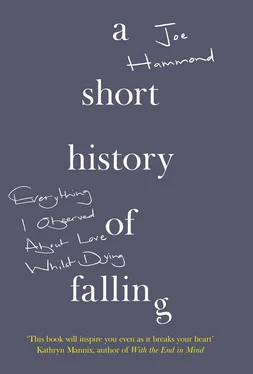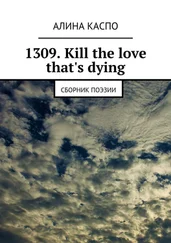‘Your face is lopsided.’
‘Is it?’
I really like Doctor Tiago. His smile is perhaps the broadest and most expressive smile I have ever encountered. It is so broad and all-encompassing that it seems to subsume his entire face, right up to his eyebrows. A couple of months earlier he had found me wandering the corridors, having arrived at the hospital for a non-existent appointment. He seemed much more like a very young and enthusiastic uncle than a doctor. On that occasion he set up an impromptu clinic in what seemed like a stationery cupboard and we went from there. In all my time with the hospital, I was never really aware of how appointments happened. They just did. It was all quite miraculous. And so I don’t mind that he put so much effort into trying to find a brain tumour. He was clearly misled by my face. Even the neurologist who did my CAT scan said I had a brain tumour. They couldn’t find any evidence of a tumour. This didn’t matter. They remained convinced. Cheerfully so. Apparently a brain tumour is great news.
I wonder why it is important to know. It always seems so very important, particularly for doctors. But surely they seldom know. Or they seldom really know. Doctor Tiago ‘knew’ I had a brain tumour within five minutes of meeting me. But this wasn’t knowing; this was confidence. We’d have had a better conversation without confidence getting in the way. There’s so much to simply not know about the body. I’d prefer a person who really knows about something (like Doctor Tiago) to tell me all the myriad fascinating things they don’t know. Because however much a person knows about something, that knowing is minuscule compared to what they don’t know. A scale demonstration of this would involve standing next to a mountain and pouring a kilo bag of sugar on the ground. Standing back and comparing these two mounds would give the onlooker a visual comparison between the little that is known about anything by anyone (the sugar) and the vastness of what is unknown about everything by everyone (the mountain). None of us know. Even the most knowledgeable amongst us don’t know. Doctor Tiago didn’t know. I’d like to have spent more time with Doctor Tiago not knowing.
This was the third time I had seen Doctor Tiago. Each time he would make me clench my teeth and then he’d nod with certainty. This time I clenched my teeth and he seemed less certain. He was smiling less. I watched him chew on the end of a biro, weighing up whether to buy me a fantastic new train set or book tokens. Instead he sent me along the corridor to a woman who inserted much more serious and painful needles. I asked her about the brain tumour, but she wasn’t particularly interested. I liked her as well, but at no point did she give me the impression that she was my relative.
It was about an hour later when we walked back in to see Doctor Tiago. He was now seated at a desk fiddling with a piece of paper and this was when Gill noticed that his leg was twitching. Not that he wasn’t smiling any more. It’s just that on this occasion his frown needed to be displaced elsewhere within his body. In this case, to his right femur and the quadriceps that were supporting it. And this time he had a medical student with him who stood squarely and uprightly by his side, reflecting an air of high rank on Doctor Tiago to which, to his great credit, he seemed entirely unsuited. Because here was his smile again. I wonder if this is all a doctor needs. Just an engulfing smile. Its irradiating and detoxifying effects. He had clearly decided on the train set. Of course! Doctor Tiago would never fob me off with tokens. We were all back together again. But, actually, there wasn’t much of an interval between this smile and Doctor Tiago telling me that I had motor neurone disease. Or not that exactly. Not that I had this disease. Just that it would be impossible for it to be anything else. I like that. It’s perfect manners when handling bad news. It’s not that it’s the thing. It’s just not all the other things.
I had placed motor neurone disease on the same shelf in my brain where I keep the phone number for Dignitas in Switzerland. This was on a high-up shelf in the outhouse with a broken tricycle and an unused bread maker. Immediately prior to receiving the diagnosis I had been slouching in the corridor. I was holding my phone and browsing inanely through online drivel with my thumb. This was just a few moments before.
When I started crying my head was parallel with the desktop. The sob I experienced was just like the deep vibration of a kitchen tap after the mains water is turned back on. A series of metallic shudders through my spine. A chug. A gurgle. And then water. I remember looking up at Gill. She was crying more gently as she looked down at me. I was over her knee by this point, with my neck arched up towards her. And on her face was the shock of sorrow. Not for herself. For me. I will never read a face like that in a moment like that again. It’s a wonder to know, that with all the muscular variation the human face is capable of, some permutations are as unique as fingerprints.
We said our goodbyes. Doctor Tiago came out from behind his completely inappropriate desk. His hug confirmed that he was indeed my uncle. I hadn’t been imagining this at all. I’m glad that I was diagnosed in Portugal. To be amongst these warm-hearted people. In most other places, doctors seem to belong, or aspire to belong, to the notion of a particular caste or stratum. But doctors in Portugal carry themselves like people who just walked in off the street and put on a white coat. Which is what they are. Which is exactly what all doctors are. It’s just that doctors in Portugal appear to know this.
In the corridor, Gill and I ran into Paula, the medical secretary of the neurology department. She’d been expecting us. She stood there in her white coat, with her eyes moist, and her hands clasped as if she was cradling a young chick. I owe a lot to Paula. If it wasn’t for Paula, I’d still be limping around the ground floor of Coimbra hospital, somewhere near the impenetrable network of lifts. The Portuguese health system was a little tricky for me to understand. But I had Paula, so I didn’t really have to understand anything. By that time in Portugal, after my wife and boys, I’d talk to Paula more than anyone else. She’d push me around the hospital in a wheelchair and drop me at the train station after appointments. For some weeks Paula had been perfecting her version of Leonard Cohen’s ‘Hallelujah’ on the ukulele. She’d been sending me various versions as MP4 files. And now I understood. She’d known about my disease long before Doctor Tiago. I later spoke to her about this and she confirmed my theory to be partially true, but not entirely. In fact, she said that Doctor Tiago knew; he just didn’t want to admit he knew. It made him feel too sad. Maybe he was better at not knowing than I’d given him credit for. After hearing this, he went up even further in my estimation. I already loved him; there wasn’t much further up for him to go.
‘You will suffer. You know this, right?’
We’d rented a very old car whilst in Portugal and it had a cassette player. We just regarded it as an artefact and told Tom all about this strange device. And then a month into having the car, Tom was fiddling with the buttons and out popped a cassette. Of fado music. It had been raining all winter and we’d been driving around in the rain playing it ever since – unaware that our car had been thoughtfully preparing us for tragedy. So it felt like we understood this moment. This moment with Paula.
‘It will be hard, you know? It will be very hard.’
Paula dropped the tiny chick on the grey-tiled floor.
‘You must be happy, Gill. Oh, Gill, you must be strong!’
Читать дальше











